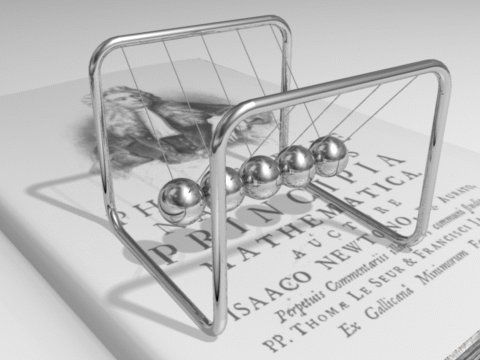In this lesson, we'll show that the principle of momentum conservation can be derived using Newton's laws of motion.
In this lesson, we'll introduce the notion of linear momentum.
In this lesson, we'll analyze the motion of object's falling near the Earth's surface at slow velocities.
Many of the concepts we use in physics are very abstract and "non-visualizable." But, nonetheless, they can be applied to tell us a great deal about how the universe works. For example, the concepts of angular momentum and the conservation of angular momentum are very abstract and it might, at least initially, not seem to have much to do with anything based in physical reality—as Feynman probably would've said, the latter is just a number that we keep measuring to be the same. But when these concepts are applied, they actually "say" or predict a lot about how the universe works: this law requires everything from solar systems being flat to a spinning ice skater rotating faster as they bring their arms in.
In this lesson, we'll introduce three concepts which are essential to cosmology: the scaling factor, Hubble's parameter, and Hubble's law. The scaling factor allows us to define the distance between galaxies as a function of time. Hubble's law, which was deduced from measurements made by the astronomer Edwin Hubble, demonstrates that the distance \(D\) between galaxies is proportional to their recessional speed \(V\) away from us; in other words, the farther away from us a galaxy is, the faster it is moving away from us. Hubble deduced that \(D∝V\) by taking numerous measurement of the distances \(D\) of speeds \(V\) of many other galaxies, plotting the measurements on a graph, and then realizing that the line of regression passing through all of the points should be a straight line. The slope of this line, today, is known as Hubble's constant; but the ratio \(D/V\) is not constant with time. The slope of \(D(V)\) vs. \(V\) as a function of time is known as Hubble's parameter. We'll also show in this lesson that we can use Hubble's parameter and Hubble's law to estimate the age of the universe to be ~14 billion years old. This estimate, however, is a little off. The correct answer is actually 13.8 billion years old.
In this lesson, we'll apply the principle of momentum conservation to analyze inelastic collisions which is when objects collide and "stick" together moving away as a single composite mass. We'll see that the conservation of momentum allows us to predict the motion after such a collision has occurred.
In this section, we discuss the various different kinds of mechanical waves: transverse, longitudinal, and some waves which have both of those aspects. Mechanical waves are disturbances which propagate through a medium and transport energy from one region of space to another. In this section, we'll start off with a qualitative description of what mechanical waves.
There are many different ways to describe rotational motion, but the most convenient way of doing so is to replace the role played by the position vector in linear motion with an angular coordinate. This will give us a way of describing the rotational motion of rigid bodies where we do not have to worry about the individual positions of every particle.
Rotational kinetic energy is not a new concept: it is just the sum of all the translational kinetic energies of all the particles comprising a system. Just like how translational kinetic energy is a very important concept in simplifying many problems related to linear motion, the same is true of rotational kinetic energy for rotational motion. Very often, in complicated situations, it is much simpler to use energy concepts than concepts related to force or torque.
We'll see that torque, rotational inertia and rotational acceleration play the same role in rotational mechanics as force, mass, and linear acceleration play in linear motion. Torque is, roughly speaking, how good of a job a given applied force will do at changing the, otherwise, uniform rotational motion; rotational inertia is how much an object resists having its rotational motion changed; and rotational acceleration captures how much the rotational motion is changing from its state of uniform rotational motion. In this section, we'll spend a lot of time focusing on developing a qualitative understanding of torque. We shall also quantify torque and derive the rotational analogue of Newton's second law.

![558932[1].jpg](https://images.squarespace-cdn.com/content/v1/58757ed7f5e231cc32494a1b/1510196967067-SB1QEEOB998QEKDXUJHB/558932%5B1%5D.jpg)









